
Arabic calligraphy alhamdulillah Royalty Free Vector Image
Explanation By Sheikh Ibn Uthaimeen "All praise and thanks" (al-Ḥamd): This word الْحَمْدُ (al-Ḥamd) is used only to describe someone, out of love and honor, with complete perfection of self, attributes, and actions. So, Allah is perfect in his self, his attributes, and his actions. This praising, however, must be with a condition, it must be made with love and honor.

Alhamdulillah Arabic Calligraphy islamic vector Free SVG
Whether you're a practicing Muslim or not, chances are you've encountered some Arabic words or Islamic religious phrases like "Alhamdulillah" in pop culture, on the news, or in your community (Islam is the second largest religion in the world and Arabic is the fifth most spoken language, after all).

Alhamdulillah In Arabic Calligraphy Alhamdulillah calligraphy
Alhamdulillah meaning and in-depth explanation have been the subject of much exegesis. It is also commonly used by non-Muslim speakers of the Arabic language. Let's look at the meaning of Alhamdulillahi, it's pronunciation, Arabic text and details explanation of this amazing Islamic phrase. Alhamdullilah Meaning In English
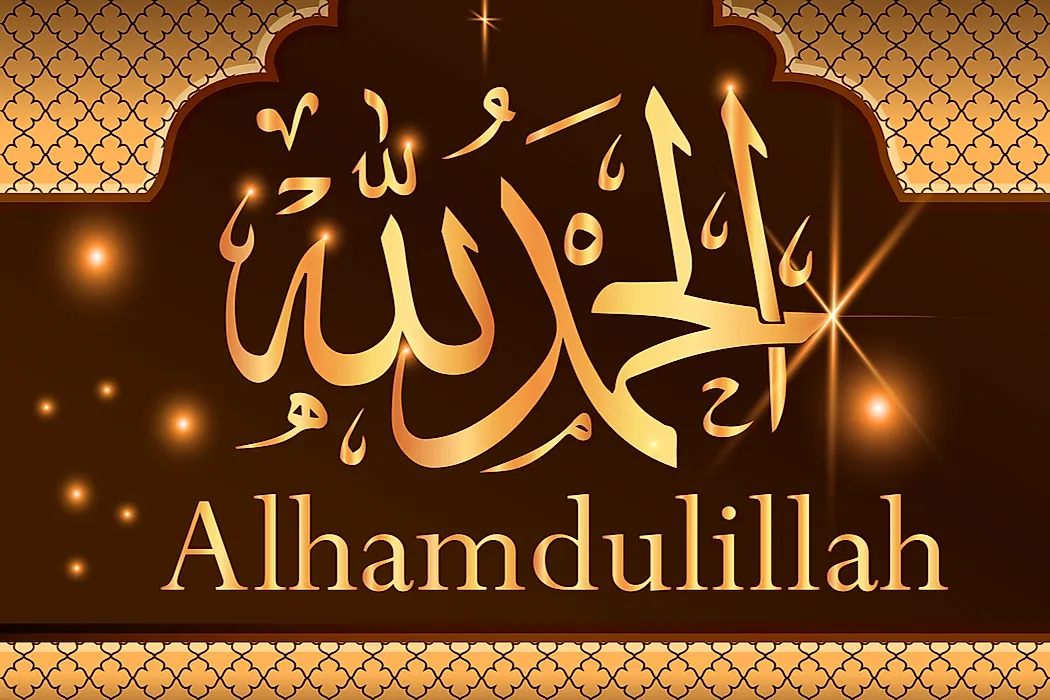
What is the Meaning of Alhamdulilah? WorldAtlas
alhamdulillah in arabic : الحمد لله alhamdulillah : الحمد لله . alhamdulillah meaning : Praises be to Allah الْحَمْدُ لِلَّهِ . Alhamdulillah: Meaning all praise and thanks belong to Allah alone because He is the originator of everything.To praise or thank something is indirectly praising and thanking Allah because He is its true Creator.

Alhamdulillah De Meeste Gebruikte Arabische Kalligrafie Vector
"Alhamdulillah" is an Arabic phrase commonly used by Muslims, and it translates to "Praise be to Allah" or "All praise is due to Allah" in English. It is a fundamental expression of gratitude and thankfulness to Allah (God) in Islam.. Here is the Alhamdulillah in Arabic text, ٱلْحَمْدُ لِلَّٰهِ (al-Ḥamdu lillāh).
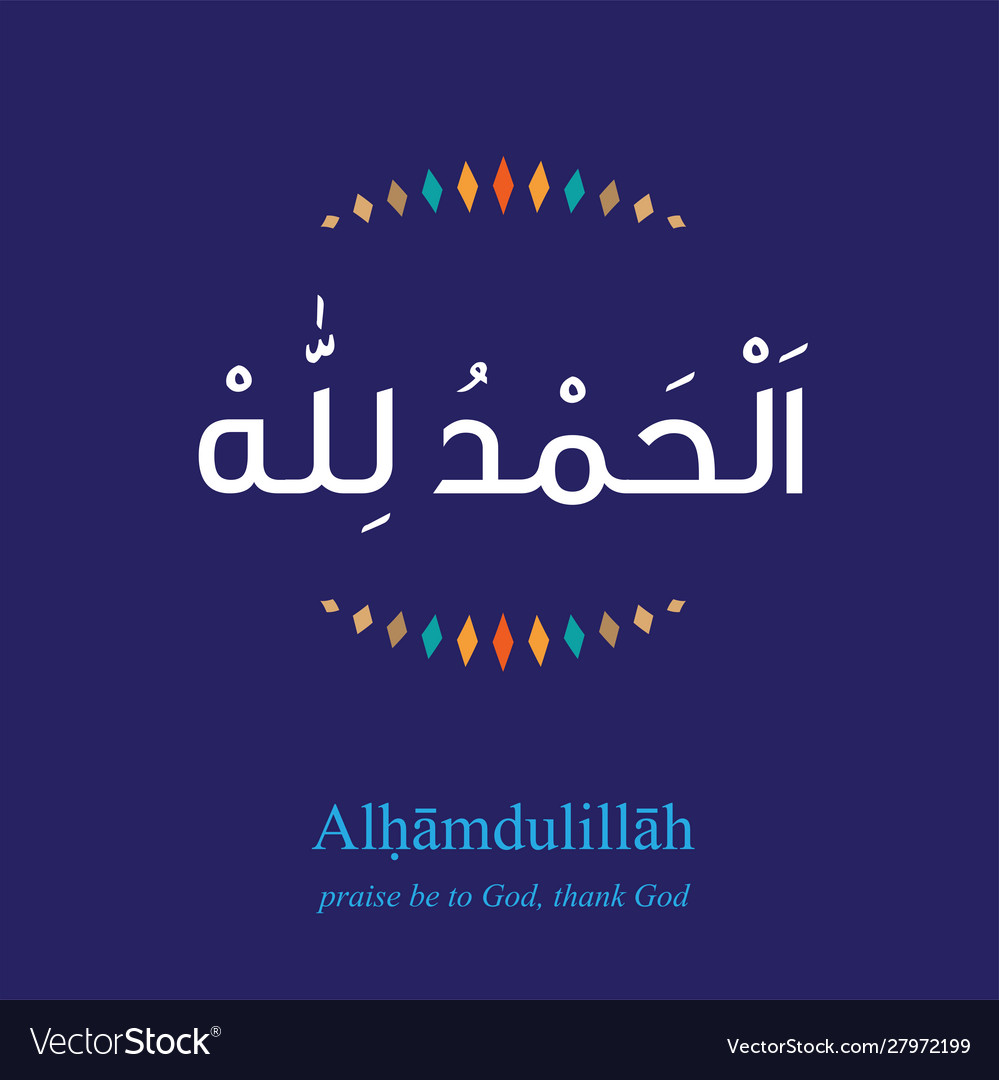
Arabic calligraphy alhamdulillah Royalty Free Vector Image
Hamdullah or alhamdulillah is the brief shape of saying Alhamdulillah. This is often an effective Arabic word that deciphers to cruel "All commend is due to Allah". The prophet -PBUH- said: "I will teach you something. After each prayer, say 33 times 'Subhanallah,' 33 times 'Alhamdulillah,' and 33 times 'Allahu akbar.'
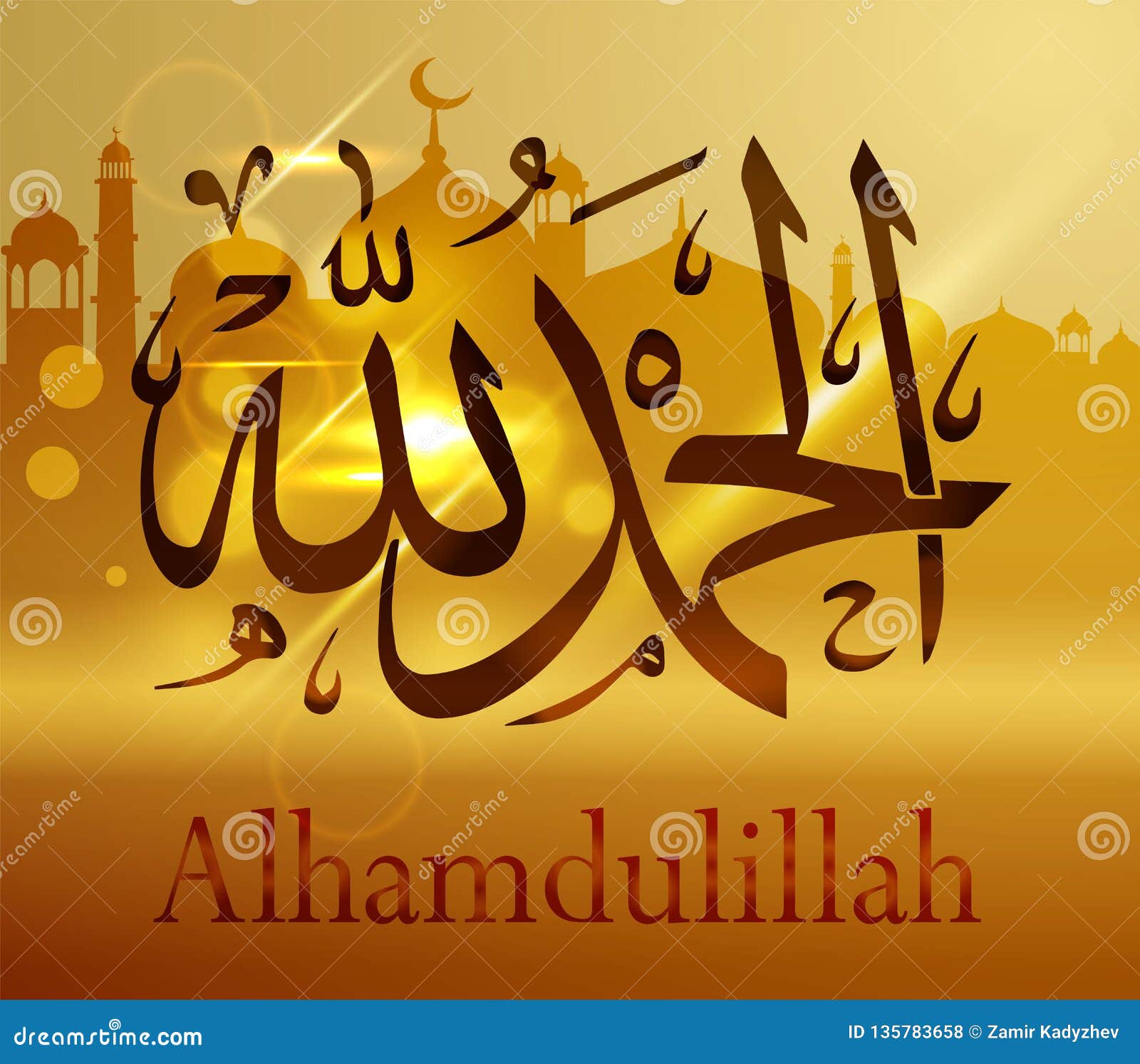
Arabic Calligraphy Alhamdulillah, Against The Background Of Mosques
Alhamdulillah in arabic: The phrase ٱلْحَمْدُ لِلَّهِ (Alhumdulillah) means "Praise be to Allah". There are many hadith on it. This word exist in Quran as well, [All] praise is [due] to Allah, Lord1 of the worlds [1:1] Copy Alhamdulillah in arabic Text: Copy text
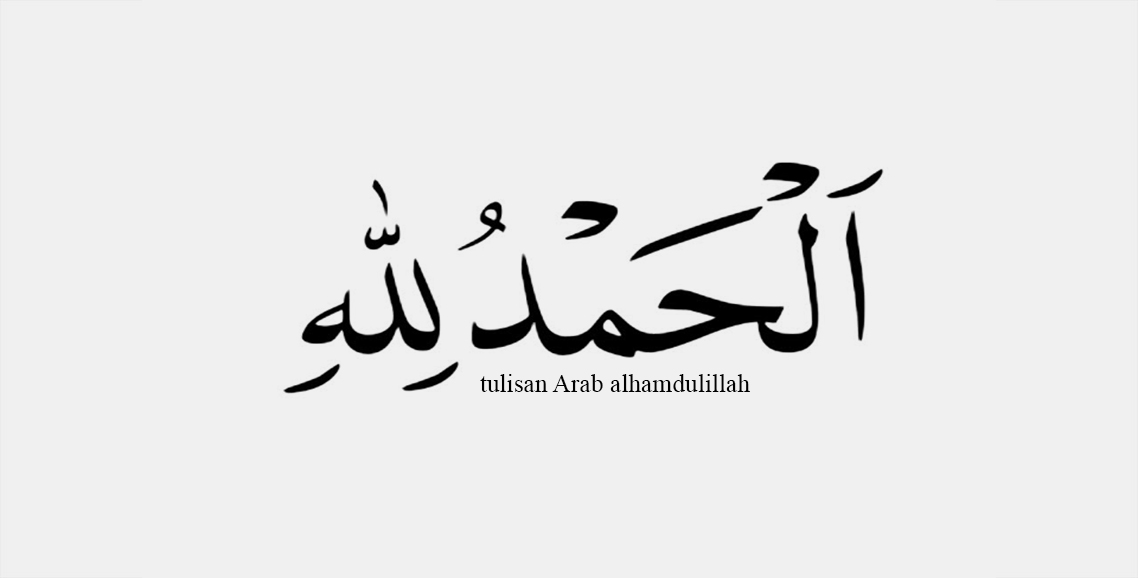
Tulisan Arab Alhamdulillah yang Sering Digunakan Ilmu Akademika
Alhamdulillah (Arabic: ٱلْحَمْدُ لِلَّٰهِ, al-Ḥamdu lillāh) is an Arabic phrase meaning "praise be to God", sometimes translated as "thank God". This phrase is called Tahmid (Arabic: تَحْمِيد, lit. 'Praising'). A longer variant of the phrase is al-ḥamdu l-illāhi rabbi l-ʿālamīn (ٱلْحَمْدُ لِلَّٰهِ رَبِّ ٱلْعَالَمِينَ.
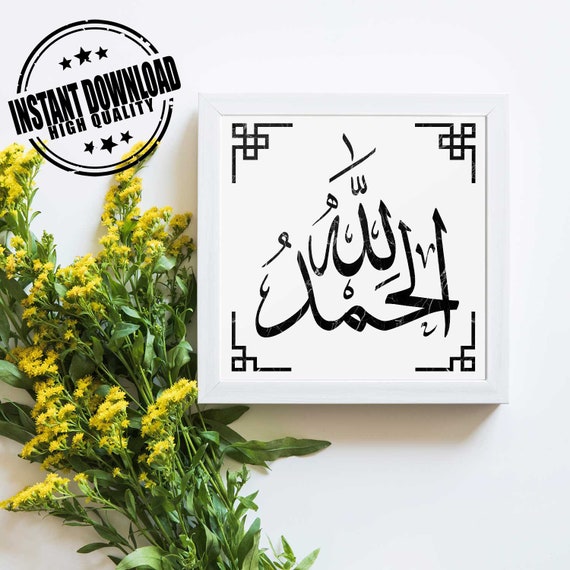
Alhamdulillah Arabic calligraphy wall art print Islamic art Etsy
Reference: Riyad As Salihin, Arabic/English Book 9, Hadith 1009. What is the meaning of Alhamdulillahi Rabbil Alamin? The literal translation of the phrase Alhamdulillahi rabbil Alamin is "Praise be to Allah, the Lord of the Universe." This comes from the second verse of Surah Fatiha, the first chapter of the Quran.

Alhamdulillah Arabic Islamic Vector of AL HAMDU LELLAH Translated as
Arabic: ·God willing; inshallah, if it is God's will (literally, "if God has willed [it]") سَأَزُوْرُ أَقَارِبِي فِي مَدِيْنَةِ الرِّيَاضِ هَذَا الصَّيْفِ، إِنْ شَاءَ اللَّهُ. saʔazuwru ʔaqāribī fī madiynati r-riyāḍi haḏā ṣ-ṣayfi, ʔin šāʔa l-lahu.
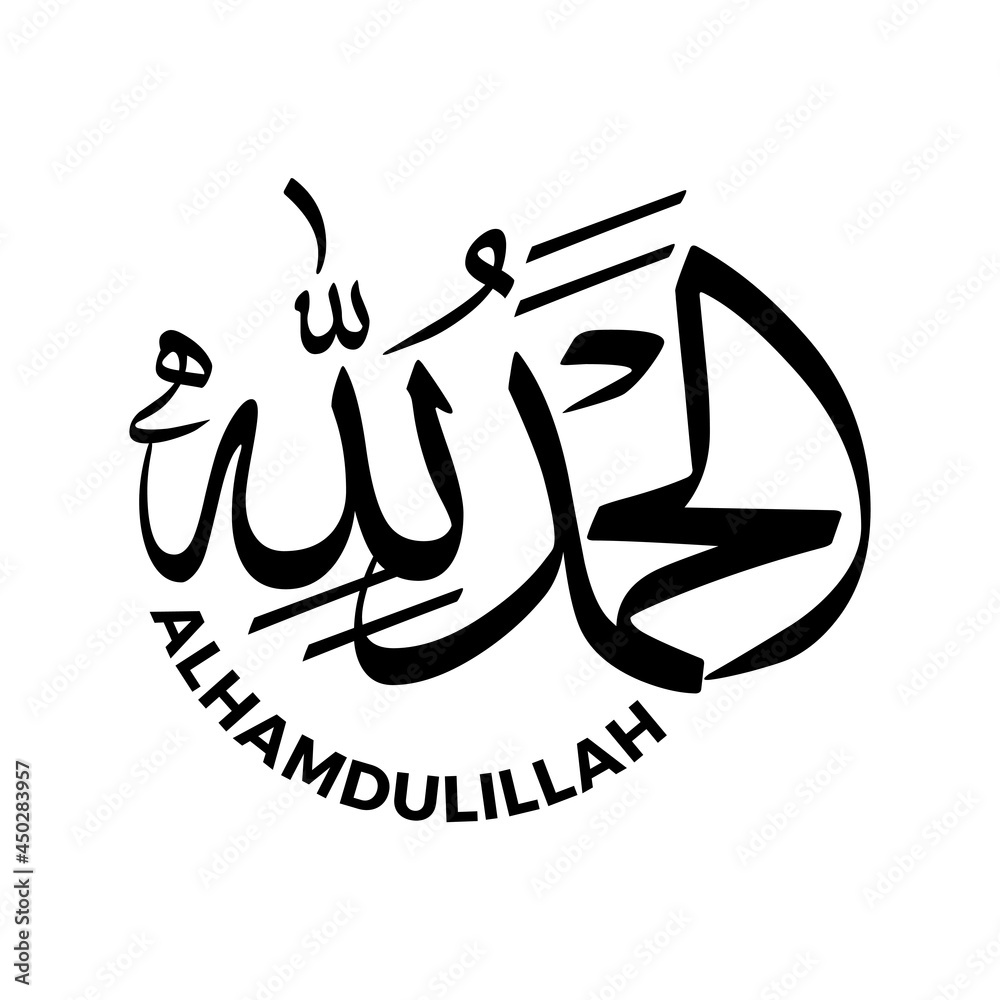
Fototapeta Alhamdulillah Arabic Calligraphy Vector and Meaning (All
This phrase is common in Arabic, and in Muslim populations around the world. It is used to express appreciation, joy, praise, or thankfulness for an event or person that was just mentioned. It is also used to express gratitude, joy, and praise when something good happens. It is also used as a general expression of praise, joy, and thankfulness.

Png De Caligrafia árabe De Alhamdulillah PNG , Alhamdulillah
Alhamdulillah can be used as a secular exclamation of pleasure, much as Americans might use the expression "Thank God." For example: "Alhamdulillah! I got an A in chemistry!" Alhamdulillah may be a statement of gratitude to God for any gift, whether it be simply the gift of life or the gift of success, health, or strength.

alhamdulillah arabic calligraphy suitable for islamic design ornament
Alhamdulillah (pronounced "Al-Ham-Doo-Lil-Lah") is an Arabic word. Comprehensively it means "All praise and gratitude belongs to Allah (God)". It is a positive expression of appreciation to God for whatever happens in the life of a Muslim regardless of the situation.

Alhamdulillah Arabic Calligraphy Lettering Design SVG Etsy
In fact, Alhamdulillah is such a normal part of Egyptian Arabic that non-religious people use it as well (kind of like "Thank God" in English). While there are no alternative meanings for Alhamdulillah, Muslims use the phrase in many different contexts. Here are five of the main ways Alhamdulillah is used: 1.

Alhamdulillah Calligraphy Written In Arabic Text Transparent Background
Alhamdulillah (also called tahmid or hamdala) is a very short prayer that is repeated as devotional acts praising Allah. This is known as dhikr (zikir). The exact meaning of Alhamdulillah (pronounced "al-ham-doo-li-lah") means "Praise be to Allah".. [Muslim] Book Riyad as-Salihin Arabic/English book reference: Book 16, Hadith 1420 21.

Black text on blue background, Alhamdulillah Quran Allah Arabic
The text encourages the reader to ask him or herself, "can I count the favors of Allah in my life?" My takeaway from the Messenger's commentary regarding this supplication is that, whether in ease or in hardship, one ought to be able to proudly say "Alhamdulillah." The Noble Qur'an describes humanity as ignorant, hasty, and ungrateful.